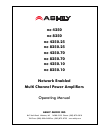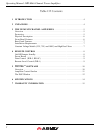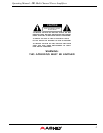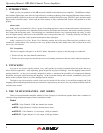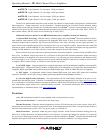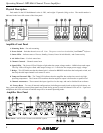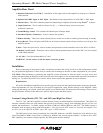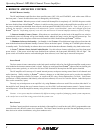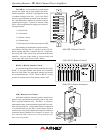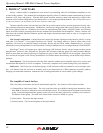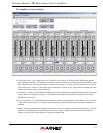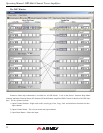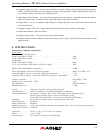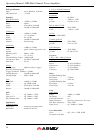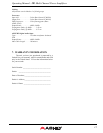
5
Operating Manual - NE Multi Channel Power Amplifiers
ne4250.70 - Four Channels, 70 volt output, 250W per channel
ne8250.70 - Eight Channels, 70 volt output, 250W per channel
ne4250.10 - Four Channels, 100 volt output, 250W per channel
ne8250.10 - Eight Channels, 100 volt output, 250W per channel
The basic NE multichannel amplifiers come in either four channel or eight channel configurations with Euroblock
input connectors. Output connectors are also Euroblock. Standard features on all models include balanced analog
inputs, bridge mono mode per channel pair, full ethernet control using Protea
ne
software, remote standby for power up,
contact closure preset recall, remote control through micropocessor based devices such as the Ashly WR-5, RD-8C, or
other custom control, and DC remote level control using an Ashly WR-1.
Additional hardware options for the NE
multichannel power amplifiers include the following:
1) Internal DSP Processing - With this factory installed option, and using Protea
ne
(network enabled) software,
each amplifier input channel can be configured with pluggable DSP blocks to have its own dynamics control, gain
functions, graphic and/or parametric EQ, Hi-pass/Lo-pass filters, time delay, metering, and test signal generator. A
mixer section with assignable routing allows any input to drive any or all amplifier outputs. Outputs have the same DSP
functions as inputs, with the addition of a fast, automated crossover setup. Both inputs and outputs can copy/paste their
settings to other channels, or can link with one or more other channels to track their settings.
Presets can be used to store and retrieve global parameters of an entire amplifier’s control surface and DSP section
from a file. In addition, Sub Presets allow for a collection of individual DSP function parameters within and across
multiple channels of an amplifier to be stored and recalled as a set, affecting only those parameters and channels which
have been tagged. Up to 35 presets/subpresets can be stored within the amplifier, and can be recalled in real time from
a computer, WR-5 remote control, or contact closure switches (up to four).
2) AES/EBU Input - Using an optional four or eight channel input card, NE
multichannel amplifiers can accept AES/
EBU digital inputs. This protocol allows 2 channels of digital audio to be transmitted over a single cable, thus maintaining a
completely digital signal path until just before the power amplification stage. 48kHz & 96kHz data rates are supported.
3) MIC Inputs - In conjunction with the factory installed DSP option, four analog MIC inputs can be installed
(instead of AES/EBU) for full gain, mixing, and dsp processing capabilities using Protea
ne
software.
4) Network Digital Audio (Cobranet) - This option allows the NE multichannel amplifier to be part of a net-
worked audio distribution system. CobraNet is a technology developed and supported by Cirrus Logic (www.cirrus.com).
It is a combination of software, hardware and network protocol which allows distribution of multiple channels of real-
time, high quality digital audio over a standard Ethernet Network. For detailed information about CobraNet or its
implementation or installation please visit www.cobranet.info.
Protection
Ashly NE multichannel amplifiers come standard with several protection circuits:
Over Current Protection - Is controlled in the output stage.
Thermal Protection - When the internal temperature is below 40°C the fan runs at its slowest speed. Above 40°C
the speed is increased until it reaches its maximum value. If the temperature exceeds 100°C, the input on that channel is
reduced. If the temperature exceeds 120°C, the power supply is switched off.
Mains Protections – protection within the power supply includes: Inrush Current Limitation during power up,
Mains Over Voltage Detection, and internal Mains Fuse Protection. To protect the Mains fuse against AC overcurrent
due to excessive audio output current, there is a protection scheme controlled in Protea
ne
software and indicated on the
amplifier front panel which reduces audio output level until the overcurrent condition is no longer present.



